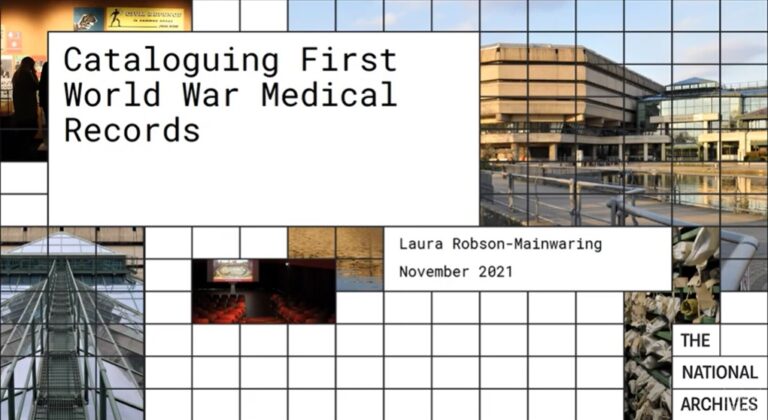On day four of Catalogue Week 2021 the focus is on the First and Second World Wars. Laura Robson-Mainwaring begins by discussing the process of cataloguing First World War medical diaries. Michael McGrady then looks at the challenges presented by abbreviations and identification in cataloguing Second World War diaries, and James Cronan explores the awarding of civilian honours. Lastly, volunteer Peter Helmore tells the story of Leonard Orpin, a British civilian interned during wartime.
Cataloguing First World War medical records
The focus of Laura Robson-Mainwaring’s presentation for Catalogue Week 2021 is the record series MH 106, a series held at The National Archives that contains a representative sample of service personnel medical records from the First World War.
Laura provides an update on the progress made so far to the catalogue enhancement, shares some interesting finds, and points to what the future holds for the project.

CREME or DADAPS? Abbreviation and identification: Cataloguing war diaries 1939-46
The National Archives has a very large collection of army war diaries from the Second World War, and while these records are all listed in our catalogue, their descriptions can make them difficult to find, especially by comparison to the First World War diaries.
Several years ago, a project began to improve the listing of the war diaries, covering the various series from each theatre of operations. The main purpose of the project was to add the full text description along with the original abbreviations, and to correct anomalies in headings. It was also an opportunity to look at the records more thoroughly and learn more about their contents.
Rewarding gallantry on the Home Front: Civilian honours in the Second World War
To coincide with Catalogue Week at The National Archives, I would like to share with you the details of a project we are working on. Together with three dedicated volunteers, we are improving the catalogue descriptions for the series T 336, Second World War Civil Defence Awards Files.
When it comes to loss of life, gallant action and devotion to duty in the Second World War, people immediately think of the armed forces, then probably the Merchant Navy, and finally to civilians at home. In the aftermath of the Battle of Britain, and at the outset of the Blitz, enormous devastation was caused by air raids. During the course of the war, 60,595 civilians died as a result of enemy action in the UK. Homes, workplaces and public buildings were destroyed.
Leonard Orpin: A tale of two wars
Since 2017 a team of volunteers at The National Archives has been devoting its time to the series WO 416, preparing the item descriptions ready for the catalogue (Discovery) ahead of the planned opening of the whole series in 2023. The series comprises 414 boxes of German record cards of British and Commonwealth prisoners of war and some civilian internees. The year 2028 is a critical date as by then it is calculated that all persons mentioned on the cards would have passed their 100th birthday and therefore, under current regulations, the records may be opened in entirety for public inspection.